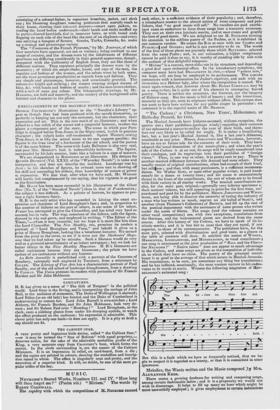MUSIC.
Numromat's Sacred Works, Numbers III. and IV. " How long wilt thou forget me ? " (Psalm "Miriam." The words by
BARRY CORNWALL.
The rapidity with which the compositions of M. Nays= succeed each other, is a sufficient evidence of their popularity ; and, therefore, a triumphant answer to the absurd notion of some composers and pub- lishers, that "no good music will sell." No vocalists are paid exorbi- tant sums to endeavour to force these songs into a transient existence. They rest on their own intrinsic merits, and at once create and gratify the love of good music. We are delighted to see M. NEVICOMM turning his attention to the sublime poetry of the Psalms, as it is exhibited in our common version. He enters the liits at once with our CROFTS and Pencam.s1 and GREENS; and he is not unworthy to do so. The words of the first of these pieces are precisely those which BATTISHILL selected from the same Psalm ; and, in our estimation, a higher compliment cannot be paid it than to say, it is worthy of standing side by side with the anthem of that delightful composer.
"Miriam" is a cantata, more elaborate in its structure, and depending a good deal upon orchestral effect. In the introductory symphony, the composer must have had DRAGONETTI in view,—whose " potent arm," we hope, will ere long be employed in its performance. The cantata commences with a lamentation for Judea's captivity, and ends with an invocation to a Hebrew lady, after whom the composition is named. We must again remark, that however clever Mr. BARRY CORNWALL may be as a song-writer, he is quite out of his element in attempting Sacred poetry. There is neither the structure, the features, nor the imagery of Hebrew song. But the music is full of beauty ; and the transitions, masterly as they are, seem to originate without effort. This cantata does not seem to have been written for any public singer in particular : we commend it to the especial notice of Mr. BRAHANI.


























 Previous page
Previous page